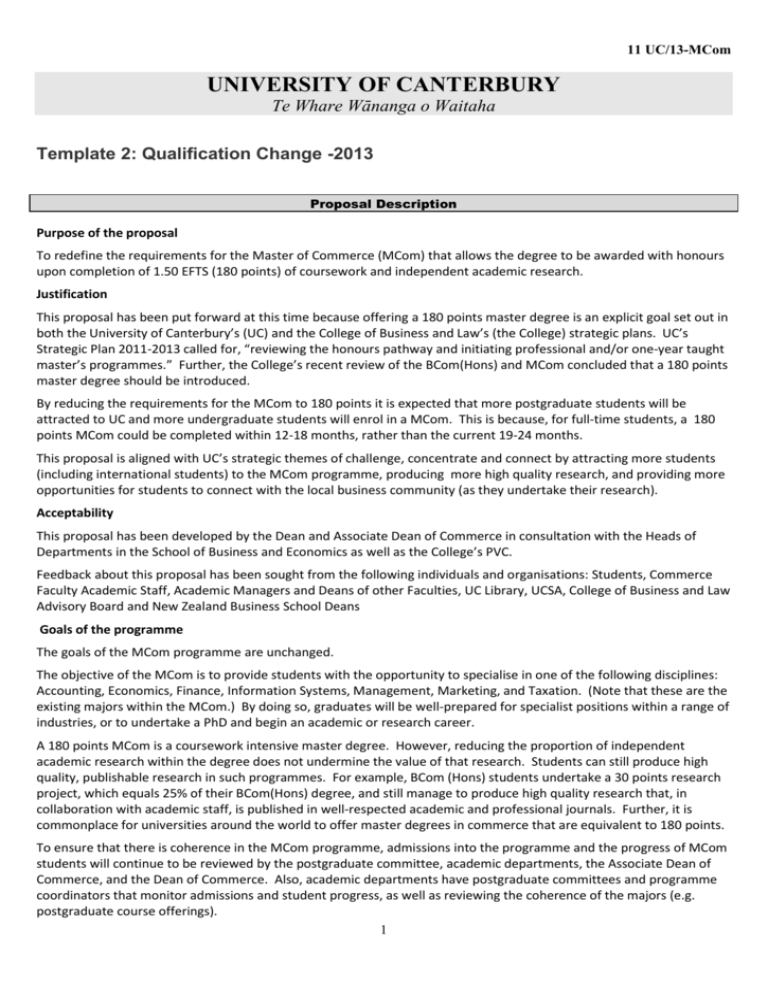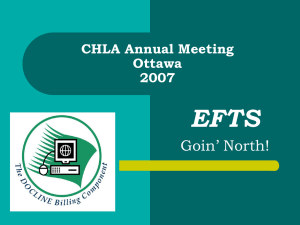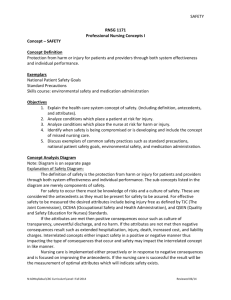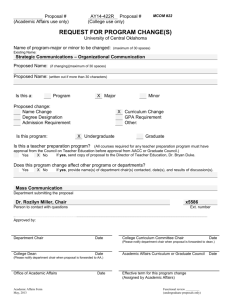Master of Commerce - University of Canterbury
advertisement

11 UC/13-MCom UNIVERSITY OF CANTERBURY Te Whare Wānanga o Waitaha Template 2: Qualification Change -2013 Proposal Description R Purpose of the proposal To redefine the requirements for the Master of Commerce (MCom) that allows the degree to be awarded with honours upon completion of 1.50 EFTS (180 points) of coursework and independent academic research. Justification This proposal has been put forward at this time because offering a 180 points master degree is an explicit goal set out in both the University of Canterbury’s (UC) and the College of Business and Law’s (the College) strategic plans. UC’s Strategic Plan 2011-2013 called for, “reviewing the honours pathway and initiating professional and/or one-year taught master’s programmes.” Further, the College’s recent review of the BCom(Hons) and MCom concluded that a 180 points master degree should be introduced. By reducing the requirements for the MCom to 180 points it is expected that more postgraduate students will be attracted to UC and more undergraduate students will enrol in a MCom. This is because, for full-time students, a 180 points MCom could be completed within 12-18 months, rather than the current 19-24 months. This proposal is aligned with UC’s strategic themes of challenge, concentrate and connect by attracting more students (including international students) to the MCom programme, producing more high quality research, and providing more opportunities for students to connect with the local business community (as they undertake their research). Acceptability This proposal has been developed by the Dean and Associate Dean of Commerce in consultation with the Heads of Departments in the School of Business and Economics as well as the College’s PVC. Feedback about this proposal has been sought from the following individuals and organisations: Students, Commerce Faculty Academic Staff, Academic Managers and Deans of other Faculties, UC Library, UCSA, College of Business and Law Advisory Board and New Zealand Business School Deans Goals of the programme The goals of the MCom programme are unchanged. The objective of the MCom is to provide students with the opportunity to specialise in one of the following disciplines: Accounting, Economics, Finance, Information Systems, Management, Marketing, and Taxation. (Note that these are the existing majors within the MCom.) By doing so, graduates will be well-prepared for specialist positions within a range of industries, or to undertake a PhD and begin an academic or research career. A 180 points MCom is a coursework intensive master degree. However, reducing the proportion of independent academic research within the degree does not undermine the value of that research. Students can still produce high quality, publishable research in such programmes. For example, BCom (Hons) students undertake a 30 points research project, which equals 25% of their BCom(Hons) degree, and still manage to produce high quality research that, in collaboration with academic staff, is published in well-respected academic and professional journals. Further, it is commonplace for universities around the world to offer master degrees in commerce that are equivalent to 180 points. To ensure that there is coherence in the MCom programme, admissions into the programme and the progress of MCom students will continue to be reviewed by the postgraduate committee, academic departments, the Associate Dean of Commerce, and the Dean of Commerce. Also, academic departments have postgraduate committees and programme coordinators that monitor admissions and student progress, as well as reviewing the coherence of the majors (e.g. postgraduate course offerings). 1 11 UC/13-MCom Graduate profile The existing MCom Graduate Profile is reproduced below. As an MCom graduate you will be able to: 1. demonstrate higher level in-depth knowledge and understanding of contemporary thought and developments within your specific research area. 2. evaluate the implications of your own research findings for the wider body of relevant academic literature. 3. plan and undertake independent academic research that shows a sound understanding of ethical practice. 4. synthesise academic literature and communicate research findings, both orally and in written form, consistent with academics working in your chosen discipline. This proposal does not alter the existing MCom Graduate Profile. After completing 180 points (1.5EFTS), a graduate will still have achieved the four learning goals included in the MCom Graduate Profile. Outcome statement This proposal will not change the existing MCom outcomes, except that students will complete their MCom in a shorter time period. The MCom Graduate Profile (above) details the knowledge and skills that graduates will obtain in completing a MCom. The proposed MCom programme will (1) afford graduates with the opportunity to continue their studies and enrol in a PhD programme at UC or elsewhere; (2) prepare graduates for specialist positions in a range of industries; and (3) provide students with the opportunity to contribute to the academic and business communities by undertaking research. Programme overview Currently, the MCom has two parts. Part I consists of 120 points (1.0 EFTS) of postgraduate courses. This usually includes a 30 points (0.25 EFTS) research methods course and a 30 points (0.25 EFTS) research project as well as four 15 points (0.125 EFTS) elective courses. (Note that the Economics and Finance majors do not require students in Part I to complete a research method course and research project.) Part II consists of a 120 points (1.0 EFTS) thesis. To gain entry into Part II, students have to complete Part I or have already completed a relevant postgraduate qualification, such as BCom(Hons). (Note that MCom Part I and BCom(Hons) are run as a joint programme.) This proposal replaces the two parts with one part (i.e. there will be no transition from Part I to Part II). Students will have to complete between 90 -120 points (0.75 or 1.0 EFTS) of postgraduate courses and research in the form of a 90 points (0.75 EFTS) thesis or a 60 points (0.5 EFTS) point dissertation. It is recognised that students who have already completed a BCom(Hons) only need to complete independent academic research to fulfil the Learning Goals in the MCom Graduate Profile. Having to complete additional coursework would be repetitive, as such will not advance these students knowledge and skills. As a BCom(Hons) is a 120 points (1.0 EFTS) degree, students only need to complete an additional 60 points (0.5 EFTS) of independent academic research in order to fulfil the MCom’s Learning Goals. However, given that a MCom cannot be awarded with fewer than 120 points (1.0 EFTS) where it builds on a BCom(Hons ), students who have already completed a BCom(Hons) will complete a 120 points (1.0 EFTS) thesis to be awarded a MCom. This proposal will not alter the majors which are Accounting, Economics, Finance, Management, Marketing, Information System, and Taxation. Confirmation of NZQA exit level of qualification to go on the New Zealand Qualifications Framework Level 9 Proposed teaching/delivery methods The proposed MCom draws on existing postgraduate courses offered by academic departments in the College, and existing research supervision capacity in the College. The existing postgraduate courses involve lectures, seminars and student led discussion. Also, students will undertake research under the supervision of one or more academic staff members. This is a campus based programme with online facilities complementing, rather than replacing, regular faceto-face contact. 2 11 UC/13-MCom Assessment procedures Assessment procedures are currently under review. Both internal assessment and formal examinations are used to assess student performance in postgraduate courses. With respect to the research component of the MCom, dissertations (60 points) will be assessed by two internal examiners, while theses (90 or 120 points) will be assessed by one internal examiner and one external examiner. This is consistent with the UC’s regulations regarding the grading of master’s level research. No additional resources are required in 2014 as a result of this proposal because existing postgraduate courses and research supervision capacity within the College will be utilised. As the number of MCom enrolments increases, additional recourses may be required if the maximum capacity in existing postgraduate courses or research supervision is reached. It is not expected that this will occur for several years. Plans for monitoring programme quality Programme quality will continue to be monitored according to existing Faculty and University processes and policies. Calendar Form Qualification Regulations UC Calendar 2013 Page 89 Commerce Graduate and Postgraduate Qualifications Time Limit Schedule The table below sets out, for the postgraduate qualifications of the Faculty, the time limit for course requirements. Note: Any extension to maximum time limits must be approved by the Dean of Commerce Full-time Min (mths) MCom MCom Thesis Only MCom (without Hons) MCom Thesis Only (without Hons) Part-time Max (mths) Min (mths) Max (mths) 12 7 12 18 12 24 18 14 14 36 24 48 12 24 14 48 UC Calendar 2013 Page 98 The Degree of Master of Commerce (MCom) See also General Course and Examination Regulations. Regulation 1- unchanged 2. Structure and Requirements of the Degree The candidate must complete courses totalling a minimum of 1.5 EFTS (180 points) including a dissertation or thesis, unless the candidate qualifies under Regulation 4 for the MCom by thesis only (1.0 EFTS; 120 points). A dissertation is equivalent to courses totalling 0.5 EFTS (60 points). A thesis is equivalent to courses totalling 0.75 EFTS (90 points) or 1.0 EFTS (120 points). The candidate must also fulfil the specific requirements of his/her chosen major. See the Schedule to the Regulations for the Degree of Master of Commerce. 3. Examination for the Degree unchanged- just renumbered 4. Courses from Other Majors A candidate may, with the approval of the Heads of Departments concerned, replace up to 0.50 EFTS (60 points) in courses prescribed for the subject major with courses prescribed in another subject major or subjects majors for a Master's degree or at an equivalent level for an Honours degree. Specific limits on the replacement of courses prescribed for the major may be specified in the Schedule to the Regulations for the Degree of Master of Commerce. If 3 11 UC/13-MCom these specific limits differ from the limit given in Regulation 4, then the more restrictive of the two shall apply Where specific limits are given in a schedule to these regulations, the more restrictive of the two shall apply. 5. Candidates with a Bachelors degree with Honours in an approved subject A candidate who has qualified for the award of a Bachelors degree with Honours, or the equivalent, in a relevant subject major may, subject to approval of the Head of Department and Dean of Commerce, complete a MCom degree in the same subject major by submission of a 1.0 EFTS (120 point) thesis of that subject and, if prescribed, an oral examination. 6. Dissertation and Thesis Requirements The following conditions shall apply to a dissertation or thesis: i and ii are unchanged iii. The candidate shall submit the dissertation or thesis by the date specified by the relevant Head of Department or the Dean of Commerce. A dissertation shall be submitted to the relevant Head of Department, whereas a thesis shall be submitted to the Postgraduate Office. iv. A dissertation shall be assessed by two internal examiners and one of the examiners may be the candidate’s supervisor. A thesis shall be assessed by one internal examiner, who cannot be the candidate’s supervisor, and one external examiner. v. Examiners should take into account the following when recommending a grade for a dissertation or thesis. For both a dissertation and a thesis, examiners should consider the extent to which the candidate has (1) demonstrated higher level in-depth knowledge and understanding of contemporary thought and developments within his/her specific research area; (2) evaluated the implications of his/her research findings for the wider body of relevant academic literature; (3) shown a sound understanding of ethical practice; and (4) synthesised academic literature and communicated research findings in a manner consistent with academics working in his/her chosen discipline. In addition, academic departments may provide examiners with guidelines on the grading of a dissertation or thesis that are specific to (1) the candidate’s chosen discipline and (2) the EFTS (points) value of the dissertation or thesis. vi. If the dissertation or thesis at its first presentation is inadequate to secure a pass in the examination, the Dean of Commerce may, when recommended by the examiners, permit the candidate to revise the thesis and resubmit it by a specified date. (Deleted to ensure consistency with Clause 9.4 of UC Master’s Thesis Guidelines.) 7. Time Limits (unchanged) 8. Class of Honours (unchanged) 9. Double Major in the MCom With the permission of each of the Heads of Department concerned, a candidate may complete the degree of Master of Commerce in two subjects majors (a double major). A candidate wishing to complete a double major in the MCom must satisfy the course requirements for entry into each subject, take courses totalling at least 0.50 EFTS (60 points) in each subject major (excluding a research project, dissertation or thesis), and complete a dissertation or thesis. The topic of the dissertation or thesis must be relevant to the two subjects majors that constitute the candidate’s double major and approved by the relevant Heads of Department. Schedule to the Regulations for the Degree of Master of Commerce For full course information, go to www.canterbury.ac.nz/courses Accounting (1) ACCT614; (2) courses totalling 0.50 EFTS (60 points) selected from ACCT601-679 (excluding ACCT614); and (3) thesis of at least 0.75 EFTS (90 points), selected from ACCT690-699. Courses totalling up to 0.25 EFTS (30 points) may be selected from any other Honours level qualifications as approved by the Head of the Department of Accounting and Information Systems. Alternatively, ACCT690 if a candidate qualifies to enrol in a MCom under Regulation 5. P: Equivalent to 60 points in Accounting at 300-level, plus 30 points at 300-level in courses which the Head of the Department of Accounting and Information Systems considers relevant. Normally a grade average of B+ or better is required in ACCT 300-level prerequisite courses or other 300-level courses which the Head of the Department of Accounting and Information Systems approves or considers relevant. 4 11 UC/13-MCom Economics (1) courses totalling 1.00 EFTS (120 points) selected from ECON601-679; and (2) a dissertation or thesis totalling at least 0.50 EFTS (or 60 points), selected from ECON691-699. Alternatively, ECON695 if a candidate qualifies to enrol in a MCom under Regulation 6. P: Equivalent to (1) ECON 201 or ECON 206; and (2) ECON 213 or STAT 213; and (3) ECON 203 or ECON 321; and (4) 60 points from 300-level Economics courses, including at least 45 points from ECON 321, ECON 322, ECON 323, ECON 324, ECON 325, ECON 326. Alternatively, a candidate may apply to enter with a Graduate Diploma in Economics or a Graduate Diploma in Science, normally including 75 points from ECON 321, ECON 322, ECON 323, ECON 324, ECON 325, ECON 326. Normally a grade average of B+ or better is required in ECON 300-level prerequisite courses. Finance (1) courses totalling 1.00 EFTS (120 points) selected from FINC601-679; and (2) a dissertation or thesis totalling at least 0.50 EFTS (or 60 points), selected from FINC691-699. Enrolment in any combination of courses is subject to the approval of the Head of the Department of Economics and Finance. Candidates can normally attempt each course on offer only once. Alternatively, FINC695 if a candidate qualifies to enrol in a MCom under Regulation 5. P: Equivalent to either: a BSc or BCom with major in Finance, including (1) ECON 202, (ECON 213 or any 30 points from STAT 200-level courses), FINC 205, FINC 331; and (2) at least a B+ average in 300-level FINC courses. Or: a bachelors degree in a subject other than Finance, but including: (1) (ECON 213 or any 30 points from STAT 200-level courses), FINC 331 plus an additional 30 points of 300-level Finance; and (2) At least A- average in 300-level FINC courses. Information Systems (1) INFO614; (2) courses totalling 0.50 EFTS (60 points) selected from INFO601-679 (excluding INFO614) and COSC401459; and (3) a thesis totalling at least 0.75 EFTS (90 points), selected from INFO690-699. Enrolment in 400-level COSC courses is subject to approval of the Head of the Department of Computer Science and Software Engineering. Courses totalling up to 0.25 EFTS (30 points) may be selected from any other Honours level qualifications as approved by the Head of the Department of Accounting and Information Systems. Alternatively, INFO690 if a candidate qualifies to enrol in a MCom under Regulation 5. P: Equivalent to 60 points in Information Systems at 300-level, plus 30 points at 300-level in courses which the Head of the Department of Accounting and Information Systems considers relevant. Normally a grade average of B+ or better is required in INFO 300-level prerequisite courses or other 300-level courses which the Head of the Department of Accounting and Information Systems approves or considers relevant. Management (1) MGMT620; (2) courses totalling 0.50 EFTS (60 points), selected from (MGMT610-619 and MGMT640-649); and (3) a thesis totalling at least 0.75 EFTS (90 points), selected from MGMT690-699. Under special circumstances, courses totalling up to 0.125 EFTS (15 points) may be replaced by other graduate courses subject to the approval of the Head of the Department of Management, Marketing and Entrepreneurship. Alternatively, MGMT695 if a candidate qualifies to enrol in a MCom under Regulation 5. P: Equivalent to a B+ average or better across 90 points of 300-level courses in Management. Up to 30 points from 300level courses may be from a related discipline or field (eg, management science, economics, accounting, finance, information systems, organisational psychology, sociology, organisational communication, mass communication, public relations). Marketing (1) MKTG620; (2) courses totalling 0.50 EFTS (60 points) selected from MKTG610-619; and (3) a thesis totalling at least 0.75 EFTS (90 points), selected from MKTG691-699. Courses totalling up to 0.125 EFTS (15 points) may be replaced by 5 11 UC/13-MCom other graduate courses subject to the approval of the Head of the Department of Management, Marketing and Entrepreneurship. Alternatively, MKTG695 if a candidate qualifies to enrol in a MCom under Regulation 5. P: Equivalent to (1) MKTG 280 (or equivalent), and at least 90 points of 300-level MKTG courses; or (2) MSCI 210 (or equivalent) and at least 84 points from MGMT 310–319 or MGMT 340–349. A B+ average or better across all courses in (1) or (2) is required. Taxation (1) ACCT614, ACCT626 and ACCT634; (2) courses totalling 0.25 EFTS (30 points) selected from ACCT601-679 (excluding ACCT614, ACCT626 and ACCT634); and (3) a thesis totalling at least 0.75 EFTS (90 points), selected from TAXA690-699. Courses totalling up to 0.25 EFTS (30 points) may be selected from any other Honours level qualifications as approved by the Head of the Department of Accounting and Information Systems. Alternatively, ACCT690 if a candidate qualifies to enrol in a MCom under Regulation 5. P: Equivalent to (1) ACCT 254; and (2) 60 points in Accounting or Taxation at 300-level, plus 30 points at 300-level in courses which the Head of the Department of Accounting and Information Systems considers relevant. Normally a grade average of B+ or better is required in ACCT 300-level prerequisite courses or other 300-level courses which the Head of the Department of Accounting and Information Systems approves or considers relevant. New courses ACCT 694 MCom Thesis 0.7500 EFTS P: Subject to approval of the Head of Department ACCT694-14A (C) Starts Anytime ECON 691 MCom Dissertation 0.5000 EFTS P: Subject to approval of the Head of Department. Admission may be subject to meeting a sufficient standard in previous coursework. R: ECON 680 ECON691-14A (C) Starts Anytime FINC 691 MCom Dissertation 0.5000 EFTS P: Subject to approval of the Head of Department. Admission may be subject to meeting a sufficient standard in previous coursework. R: FINC 680 FINC691-14A (C) Starts Anytime INFO 694 MCom Thesis 0.7500 EFTS P: Subject to approval of the Head of Department INFO694-14A (C) Starts Anytime MGMT 694 MCom Thesis 0.7500 EFTS P: Subject to approval of the Head of Department MGMT694-14A (C) Starts Anytime MKTG 694 MCom Thesis 0.7500 EFTS P: Subject to approval of the Head of Department MKTG694-14A (C) Starts Anytime TAXA 694 MCom Thesis 0.7500 EFTS P: Subject to approval of the Head of Department 6 11 UC/13-MCom TAXA694-14A (C) Starts Anytime 7










